Global Crime and Its Impact on Society: A Study on Transnational Crime and Neoliberalism
VerifiedAdded on 2023/06/10
|12
|2654
|168
AI Summary
This study explores the impact of globalisation on transnational crime and the weaknesses of the International Criminal Court. It also discusses the role of neoliberalism in shaping criminal justice and penal guidelines. The study delves into the concepts of time-space compression, blurring of boundaries, and ontological insecurity. It concludes with a discussion on radicalisation and countering violent extremism.
Contribute Materials
Your contribution can guide someone’s learning journey. Share your
documents today.
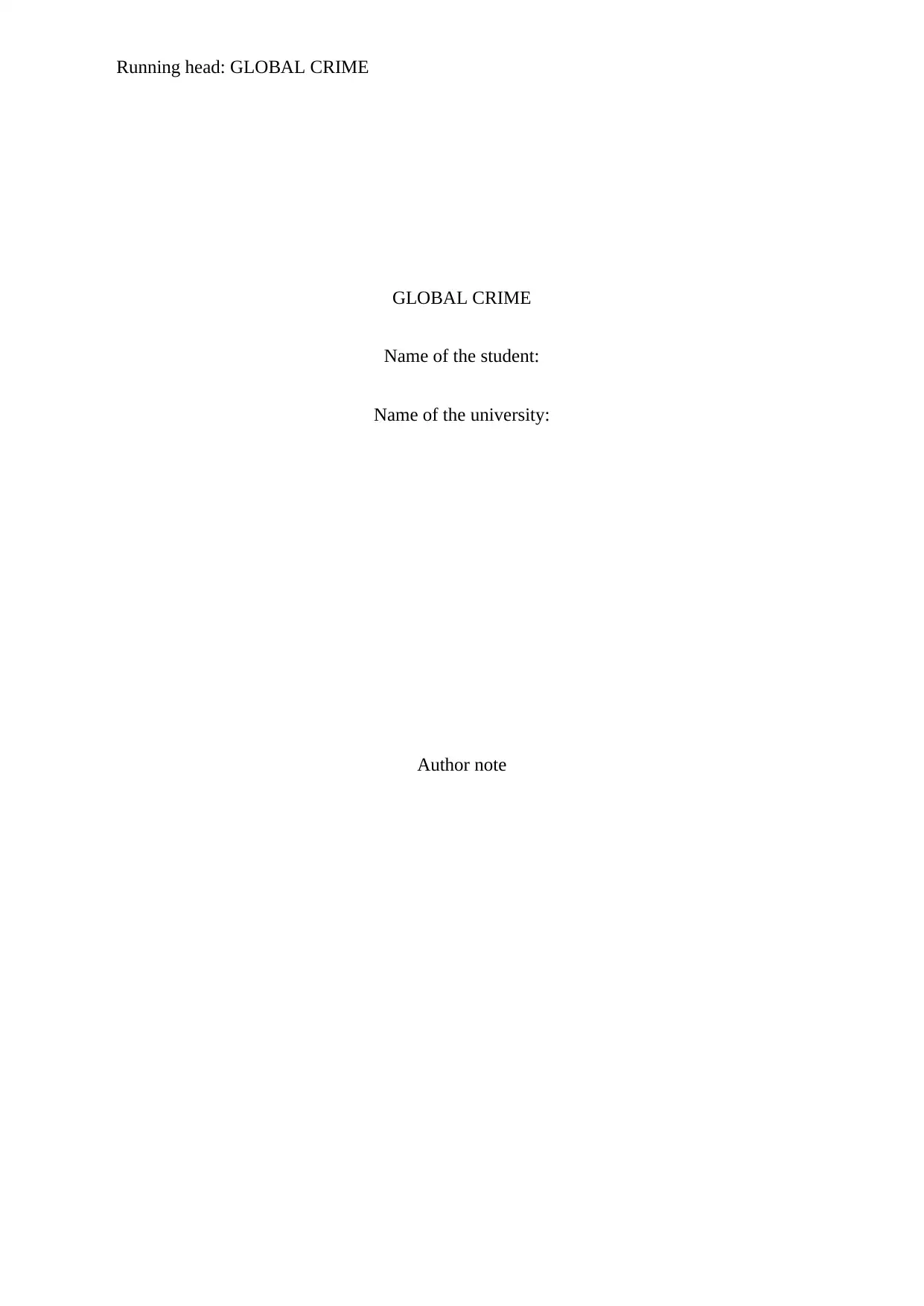
Running head: GLOBAL CRIME
GLOBAL CRIME
Name of the student:
Name of the university:
Author note
GLOBAL CRIME
Name of the student:
Name of the university:
Author note
Secure Best Marks with AI Grader
Need help grading? Try our AI Grader for instant feedback on your assignments.
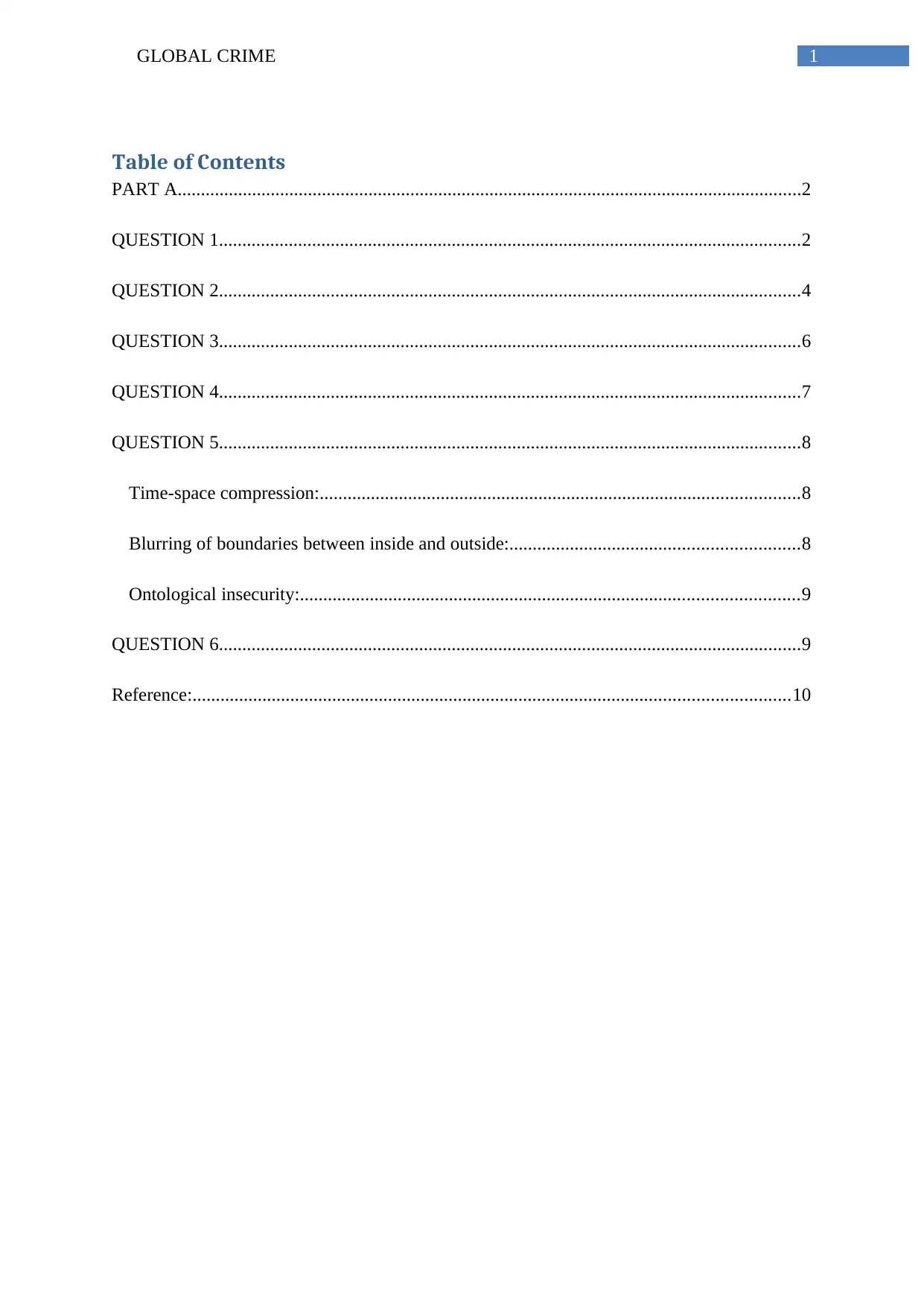
1GLOBAL CRIME
Table of Contents
PART A......................................................................................................................................2
QUESTION 1.............................................................................................................................2
QUESTION 2.............................................................................................................................4
QUESTION 3.............................................................................................................................6
QUESTION 4.............................................................................................................................7
QUESTION 5.............................................................................................................................8
Time-space compression:.......................................................................................................8
Blurring of boundaries between inside and outside:..............................................................8
Ontological insecurity:...........................................................................................................9
QUESTION 6.............................................................................................................................9
Reference:................................................................................................................................10
Table of Contents
PART A......................................................................................................................................2
QUESTION 1.............................................................................................................................2
QUESTION 2.............................................................................................................................4
QUESTION 3.............................................................................................................................6
QUESTION 4.............................................................................................................................7
QUESTION 5.............................................................................................................................8
Time-space compression:.......................................................................................................8
Blurring of boundaries between inside and outside:..............................................................8
Ontological insecurity:...........................................................................................................9
QUESTION 6.............................................................................................................................9
Reference:................................................................................................................................10
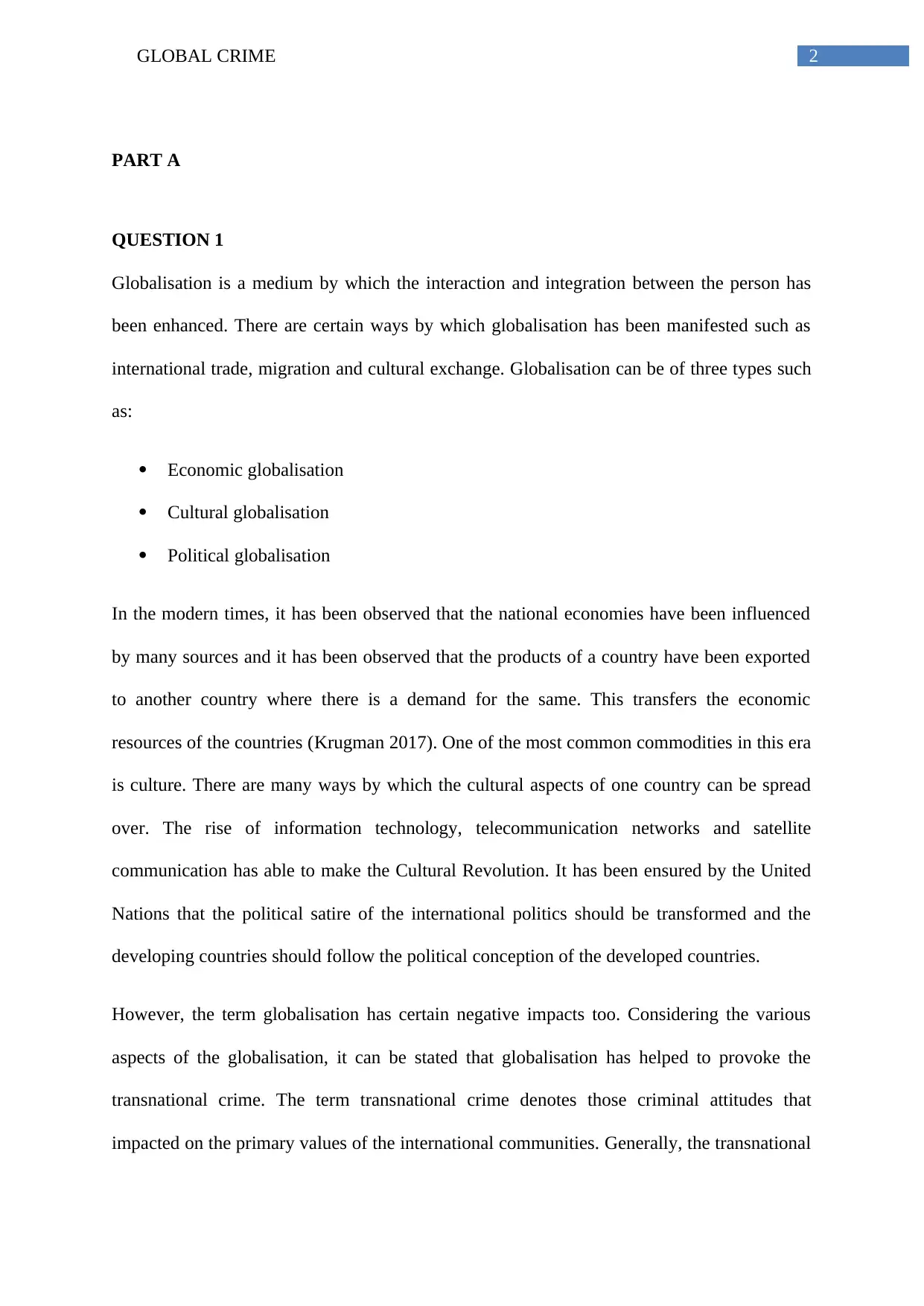
2GLOBAL CRIME
PART A
QUESTION 1
Globalisation is a medium by which the interaction and integration between the person has
been enhanced. There are certain ways by which globalisation has been manifested such as
international trade, migration and cultural exchange. Globalisation can be of three types such
as:
Economic globalisation
Cultural globalisation
Political globalisation
In the modern times, it has been observed that the national economies have been influenced
by many sources and it has been observed that the products of a country have been exported
to another country where there is a demand for the same. This transfers the economic
resources of the countries (Krugman 2017). One of the most common commodities in this era
is culture. There are many ways by which the cultural aspects of one country can be spread
over. The rise of information technology, telecommunication networks and satellite
communication has able to make the Cultural Revolution. It has been ensured by the United
Nations that the political satire of the international politics should be transformed and the
developing countries should follow the political conception of the developed countries.
However, the term globalisation has certain negative impacts too. Considering the various
aspects of the globalisation, it can be stated that globalisation has helped to provoke the
transnational crime. The term transnational crime denotes those criminal attitudes that
impacted on the primary values of the international communities. Generally, the transnational
PART A
QUESTION 1
Globalisation is a medium by which the interaction and integration between the person has
been enhanced. There are certain ways by which globalisation has been manifested such as
international trade, migration and cultural exchange. Globalisation can be of three types such
as:
Economic globalisation
Cultural globalisation
Political globalisation
In the modern times, it has been observed that the national economies have been influenced
by many sources and it has been observed that the products of a country have been exported
to another country where there is a demand for the same. This transfers the economic
resources of the countries (Krugman 2017). One of the most common commodities in this era
is culture. There are many ways by which the cultural aspects of one country can be spread
over. The rise of information technology, telecommunication networks and satellite
communication has able to make the Cultural Revolution. It has been ensured by the United
Nations that the political satire of the international politics should be transformed and the
developing countries should follow the political conception of the developed countries.
However, the term globalisation has certain negative impacts too. Considering the various
aspects of the globalisation, it can be stated that globalisation has helped to provoke the
transnational crime. The term transnational crime denotes those criminal attitudes that
impacted on the primary values of the international communities. Generally, the transnational
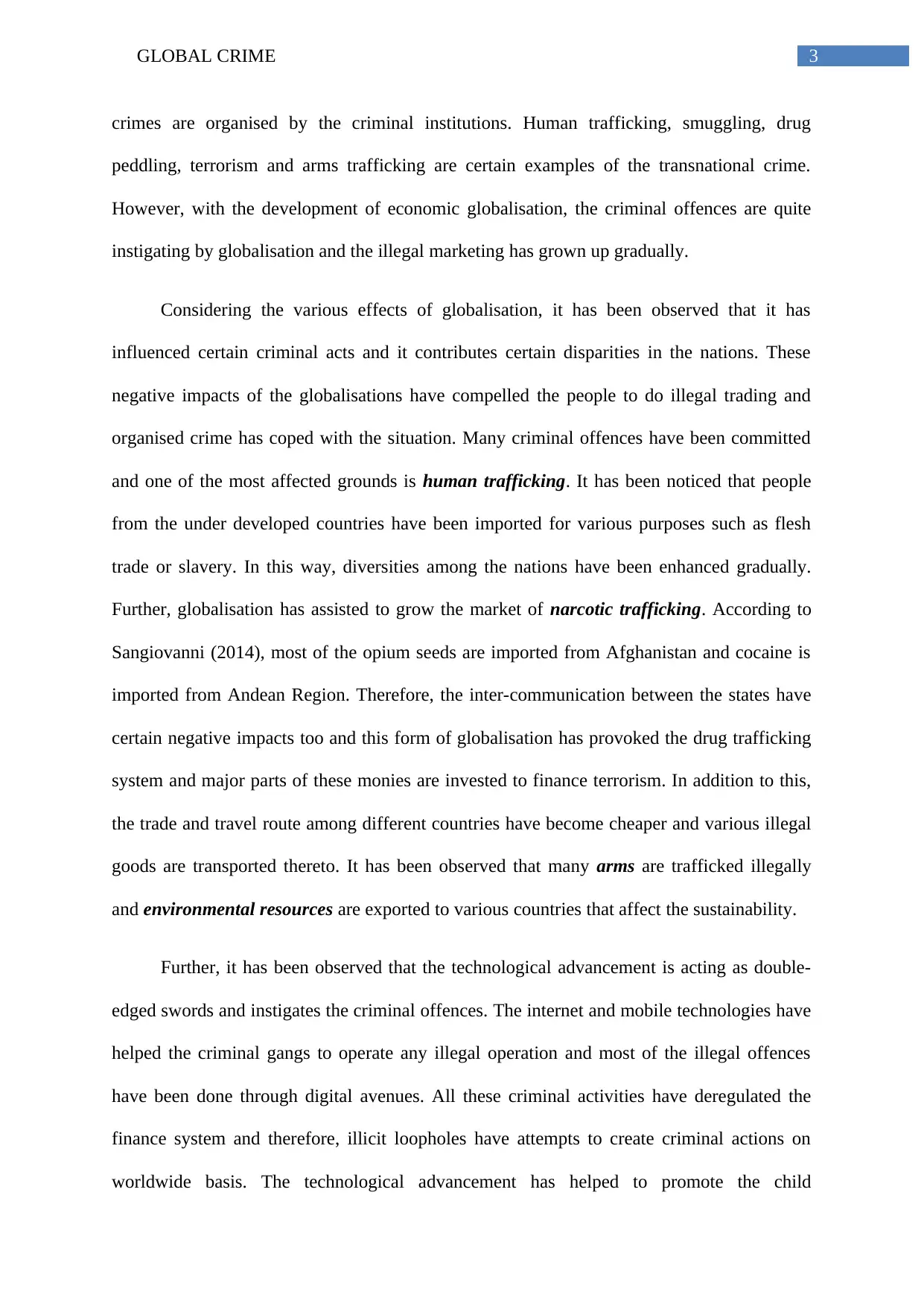
3GLOBAL CRIME
crimes are organised by the criminal institutions. Human trafficking, smuggling, drug
peddling, terrorism and arms trafficking are certain examples of the transnational crime.
However, with the development of economic globalisation, the criminal offences are quite
instigating by globalisation and the illegal marketing has grown up gradually.
Considering the various effects of globalisation, it has been observed that it has
influenced certain criminal acts and it contributes certain disparities in the nations. These
negative impacts of the globalisations have compelled the people to do illegal trading and
organised crime has coped with the situation. Many criminal offences have been committed
and one of the most affected grounds is human trafficking. It has been noticed that people
from the under developed countries have been imported for various purposes such as flesh
trade or slavery. In this way, diversities among the nations have been enhanced gradually.
Further, globalisation has assisted to grow the market of narcotic trafficking. According to
Sangiovanni (2014), most of the opium seeds are imported from Afghanistan and cocaine is
imported from Andean Region. Therefore, the inter-communication between the states have
certain negative impacts too and this form of globalisation has provoked the drug trafficking
system and major parts of these monies are invested to finance terrorism. In addition to this,
the trade and travel route among different countries have become cheaper and various illegal
goods are transported thereto. It has been observed that many arms are trafficked illegally
and environmental resources are exported to various countries that affect the sustainability.
Further, it has been observed that the technological advancement is acting as double-
edged swords and instigates the criminal offences. The internet and mobile technologies have
helped the criminal gangs to operate any illegal operation and most of the illegal offences
have been done through digital avenues. All these criminal activities have deregulated the
finance system and therefore, illicit loopholes have attempts to create criminal actions on
worldwide basis. The technological advancement has helped to promote the child
crimes are organised by the criminal institutions. Human trafficking, smuggling, drug
peddling, terrorism and arms trafficking are certain examples of the transnational crime.
However, with the development of economic globalisation, the criminal offences are quite
instigating by globalisation and the illegal marketing has grown up gradually.
Considering the various effects of globalisation, it has been observed that it has
influenced certain criminal acts and it contributes certain disparities in the nations. These
negative impacts of the globalisations have compelled the people to do illegal trading and
organised crime has coped with the situation. Many criminal offences have been committed
and one of the most affected grounds is human trafficking. It has been noticed that people
from the under developed countries have been imported for various purposes such as flesh
trade or slavery. In this way, diversities among the nations have been enhanced gradually.
Further, globalisation has assisted to grow the market of narcotic trafficking. According to
Sangiovanni (2014), most of the opium seeds are imported from Afghanistan and cocaine is
imported from Andean Region. Therefore, the inter-communication between the states have
certain negative impacts too and this form of globalisation has provoked the drug trafficking
system and major parts of these monies are invested to finance terrorism. In addition to this,
the trade and travel route among different countries have become cheaper and various illegal
goods are transported thereto. It has been observed that many arms are trafficked illegally
and environmental resources are exported to various countries that affect the sustainability.
Further, it has been observed that the technological advancement is acting as double-
edged swords and instigates the criminal offences. The internet and mobile technologies have
helped the criminal gangs to operate any illegal operation and most of the illegal offences
have been done through digital avenues. All these criminal activities have deregulated the
finance system and therefore, illicit loopholes have attempts to create criminal actions on
worldwide basis. The technological advancement has helped to promote the child
Secure Best Marks with AI Grader
Need help grading? Try our AI Grader for instant feedback on your assignments.
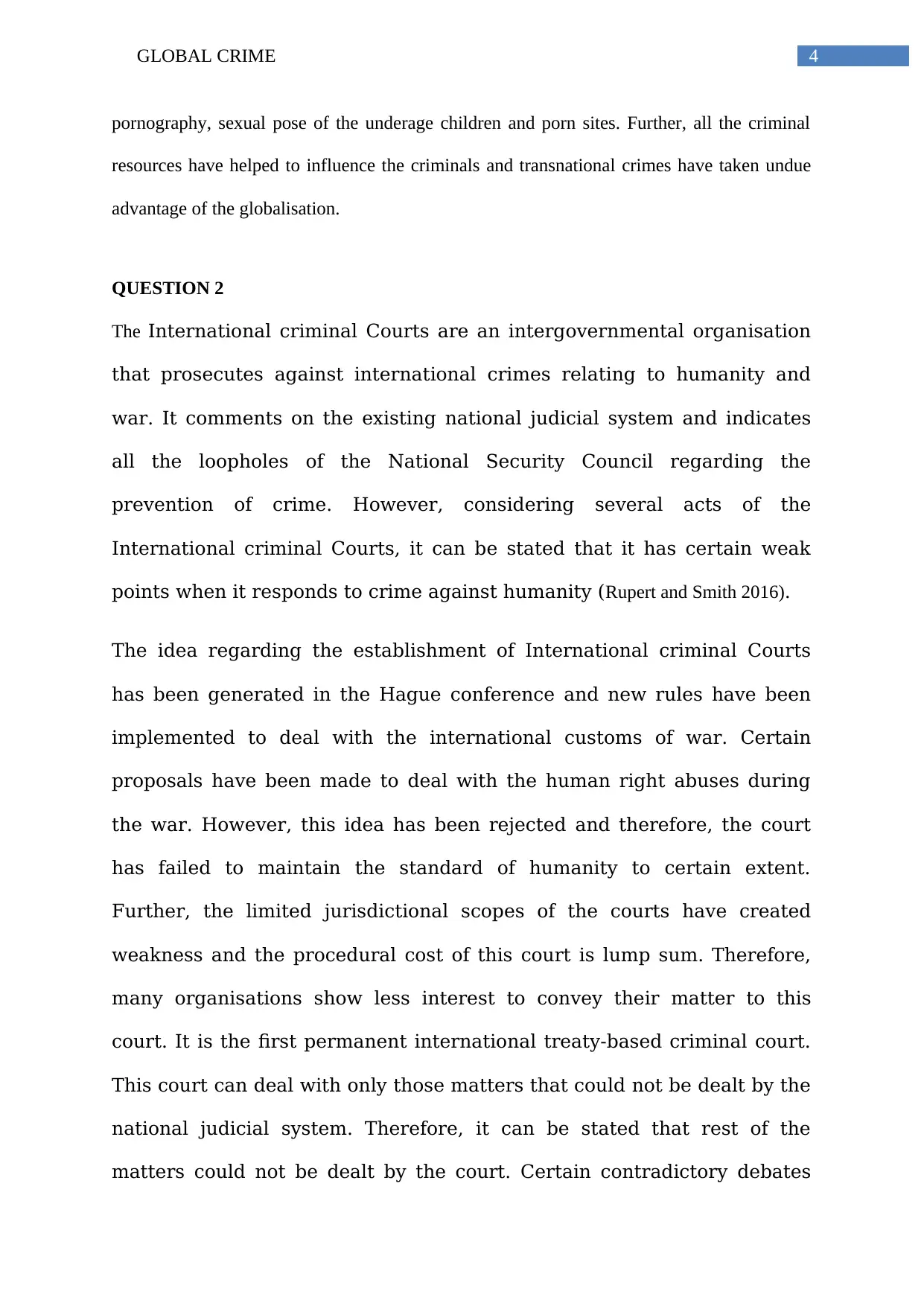
4GLOBAL CRIME
pornography, sexual pose of the underage children and porn sites. Further, all the criminal
resources have helped to influence the criminals and transnational crimes have taken undue
advantage of the globalisation.
QUESTION 2
The International criminal Courts are an intergovernmental organisation
that prosecutes against international crimes relating to humanity and
war. It comments on the existing national judicial system and indicates
all the loopholes of the National Security Council regarding the
prevention of crime. However, considering several acts of the
International criminal Courts, it can be stated that it has certain weak
points when it responds to crime against humanity (Rupert and Smith 2016).
The idea regarding the establishment of International criminal Courts
has been generated in the Hague conference and new rules have been
implemented to deal with the international customs of war. Certain
proposals have been made to deal with the human right abuses during
the war. However, this idea has been rejected and therefore, the court
has failed to maintain the standard of humanity to certain extent.
Further, the limited jurisdictional scopes of the courts have created
weakness and the procedural cost of this court is lump sum. Therefore,
many organisations show less interest to convey their matter to this
court. It is the first permanent international treaty-based criminal court.
This court can deal with only those matters that could not be dealt by the
national judicial system. Therefore, it can be stated that rest of the
matters could not be dealt by the court. Certain contradictory debates
pornography, sexual pose of the underage children and porn sites. Further, all the criminal
resources have helped to influence the criminals and transnational crimes have taken undue
advantage of the globalisation.
QUESTION 2
The International criminal Courts are an intergovernmental organisation
that prosecutes against international crimes relating to humanity and
war. It comments on the existing national judicial system and indicates
all the loopholes of the National Security Council regarding the
prevention of crime. However, considering several acts of the
International criminal Courts, it can be stated that it has certain weak
points when it responds to crime against humanity (Rupert and Smith 2016).
The idea regarding the establishment of International criminal Courts
has been generated in the Hague conference and new rules have been
implemented to deal with the international customs of war. Certain
proposals have been made to deal with the human right abuses during
the war. However, this idea has been rejected and therefore, the court
has failed to maintain the standard of humanity to certain extent.
Further, the limited jurisdictional scopes of the courts have created
weakness and the procedural cost of this court is lump sum. Therefore,
many organisations show less interest to convey their matter to this
court. It is the first permanent international treaty-based criminal court.
This court can deal with only those matters that could not be dealt by the
national judicial system. Therefore, it can be stated that rest of the
matters could not be dealt by the court. Certain contradictory debates
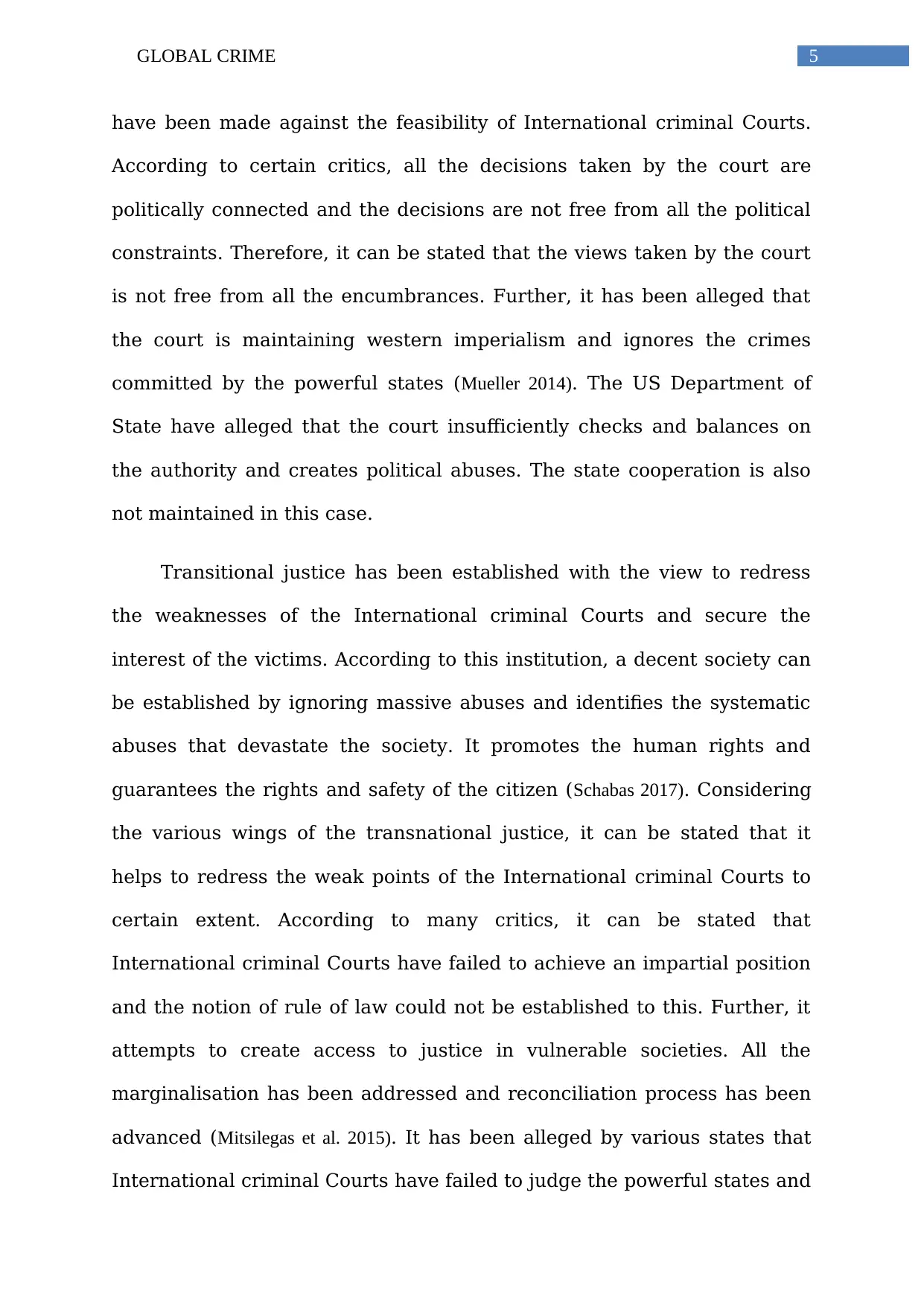
5GLOBAL CRIME
have been made against the feasibility of International criminal Courts.
According to certain critics, all the decisions taken by the court are
politically connected and the decisions are not free from all the political
constraints. Therefore, it can be stated that the views taken by the court
is not free from all the encumbrances. Further, it has been alleged that
the court is maintaining western imperialism and ignores the crimes
committed by the powerful states (Mueller 2014). The US Department of
State have alleged that the court insufficiently checks and balances on
the authority and creates political abuses. The state cooperation is also
not maintained in this case.
Transitional justice has been established with the view to redress
the weaknesses of the International criminal Courts and secure the
interest of the victims. According to this institution, a decent society can
be established by ignoring massive abuses and identifies the systematic
abuses that devastate the society. It promotes the human rights and
guarantees the rights and safety of the citizen (Schabas 2017). Considering
the various wings of the transnational justice, it can be stated that it
helps to redress the weak points of the International criminal Courts to
certain extent. According to many critics, it can be stated that
International criminal Courts have failed to achieve an impartial position
and the notion of rule of law could not be established to this. Further, it
attempts to create access to justice in vulnerable societies. All the
marginalisation has been addressed and reconciliation process has been
advanced (Mitsilegas et al. 2015). It has been alleged by various states that
International criminal Courts have failed to judge the powerful states and
have been made against the feasibility of International criminal Courts.
According to certain critics, all the decisions taken by the court are
politically connected and the decisions are not free from all the political
constraints. Therefore, it can be stated that the views taken by the court
is not free from all the encumbrances. Further, it has been alleged that
the court is maintaining western imperialism and ignores the crimes
committed by the powerful states (Mueller 2014). The US Department of
State have alleged that the court insufficiently checks and balances on
the authority and creates political abuses. The state cooperation is also
not maintained in this case.
Transitional justice has been established with the view to redress
the weaknesses of the International criminal Courts and secure the
interest of the victims. According to this institution, a decent society can
be established by ignoring massive abuses and identifies the systematic
abuses that devastate the society. It promotes the human rights and
guarantees the rights and safety of the citizen (Schabas 2017). Considering
the various wings of the transnational justice, it can be stated that it
helps to redress the weak points of the International criminal Courts to
certain extent. According to many critics, it can be stated that
International criminal Courts have failed to achieve an impartial position
and the notion of rule of law could not be established to this. Further, it
attempts to create access to justice in vulnerable societies. All the
marginalisation has been addressed and reconciliation process has been
advanced (Mitsilegas et al. 2015). It has been alleged by various states that
International criminal Courts have failed to judge the powerful states and
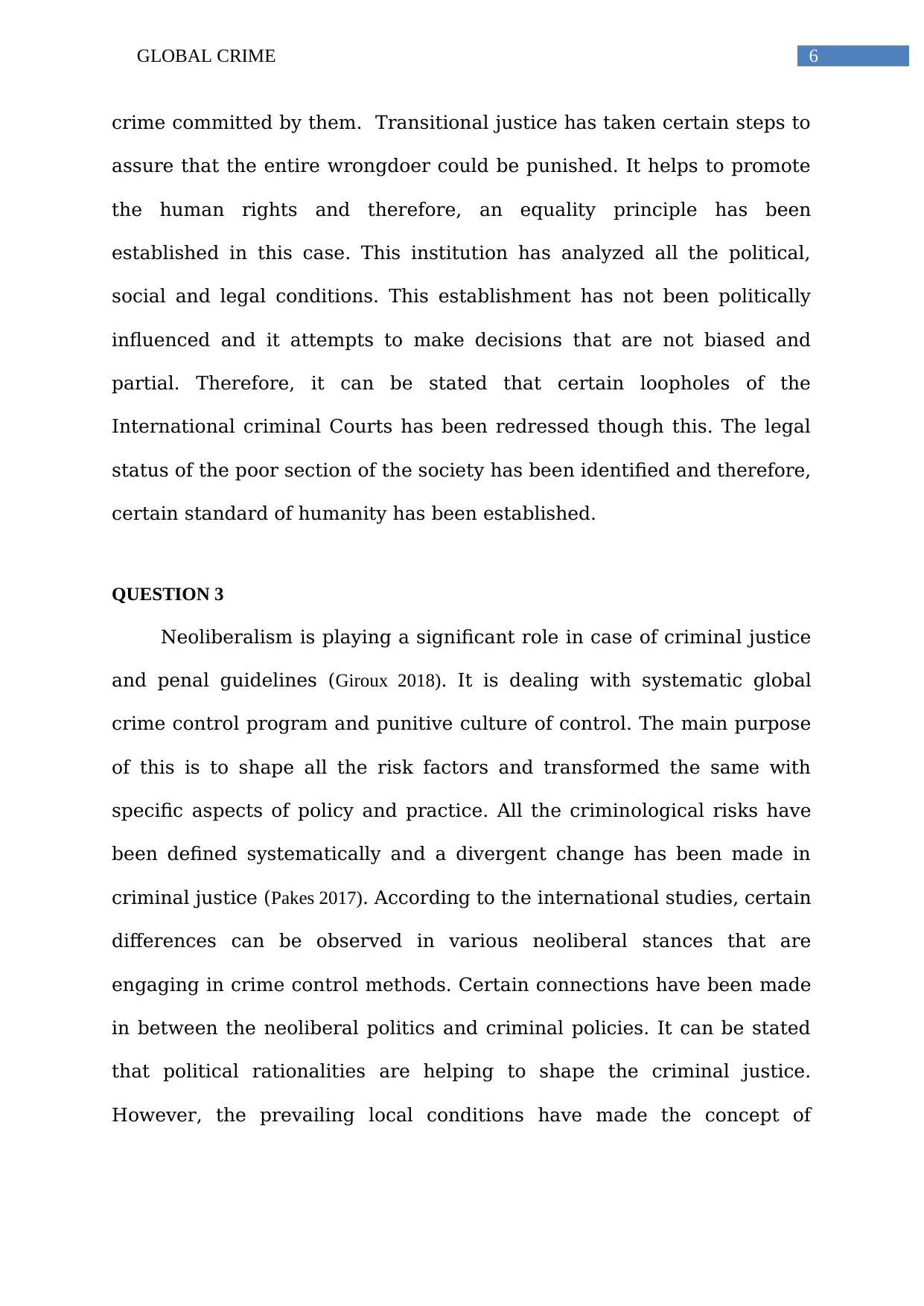
6GLOBAL CRIME
crime committed by them. Transitional justice has taken certain steps to
assure that the entire wrongdoer could be punished. It helps to promote
the human rights and therefore, an equality principle has been
established in this case. This institution has analyzed all the political,
social and legal conditions. This establishment has not been politically
influenced and it attempts to make decisions that are not biased and
partial. Therefore, it can be stated that certain loopholes of the
International criminal Courts has been redressed though this. The legal
status of the poor section of the society has been identified and therefore,
certain standard of humanity has been established.
QUESTION 3
Neoliberalism is playing a significant role in case of criminal justice
and penal guidelines (Giroux 2018). It is dealing with systematic global
crime control program and punitive culture of control. The main purpose
of this is to shape all the risk factors and transformed the same with
specific aspects of policy and practice. All the criminological risks have
been defined systematically and a divergent change has been made in
criminal justice (Pakes 2017). According to the international studies, certain
differences can be observed in various neoliberal stances that are
engaging in crime control methods. Certain connections have been made
in between the neoliberal politics and criminal policies. It can be stated
that political rationalities are helping to shape the criminal justice.
However, the prevailing local conditions have made the concept of
crime committed by them. Transitional justice has taken certain steps to
assure that the entire wrongdoer could be punished. It helps to promote
the human rights and therefore, an equality principle has been
established in this case. This institution has analyzed all the political,
social and legal conditions. This establishment has not been politically
influenced and it attempts to make decisions that are not biased and
partial. Therefore, it can be stated that certain loopholes of the
International criminal Courts has been redressed though this. The legal
status of the poor section of the society has been identified and therefore,
certain standard of humanity has been established.
QUESTION 3
Neoliberalism is playing a significant role in case of criminal justice
and penal guidelines (Giroux 2018). It is dealing with systematic global
crime control program and punitive culture of control. The main purpose
of this is to shape all the risk factors and transformed the same with
specific aspects of policy and practice. All the criminological risks have
been defined systematically and a divergent change has been made in
criminal justice (Pakes 2017). According to the international studies, certain
differences can be observed in various neoliberal stances that are
engaging in crime control methods. Certain connections have been made
in between the neoliberal politics and criminal policies. It can be stated
that political rationalities are helping to shape the criminal justice.
However, the prevailing local conditions have made the concept of
Paraphrase This Document
Need a fresh take? Get an instant paraphrase of this document with our AI Paraphraser
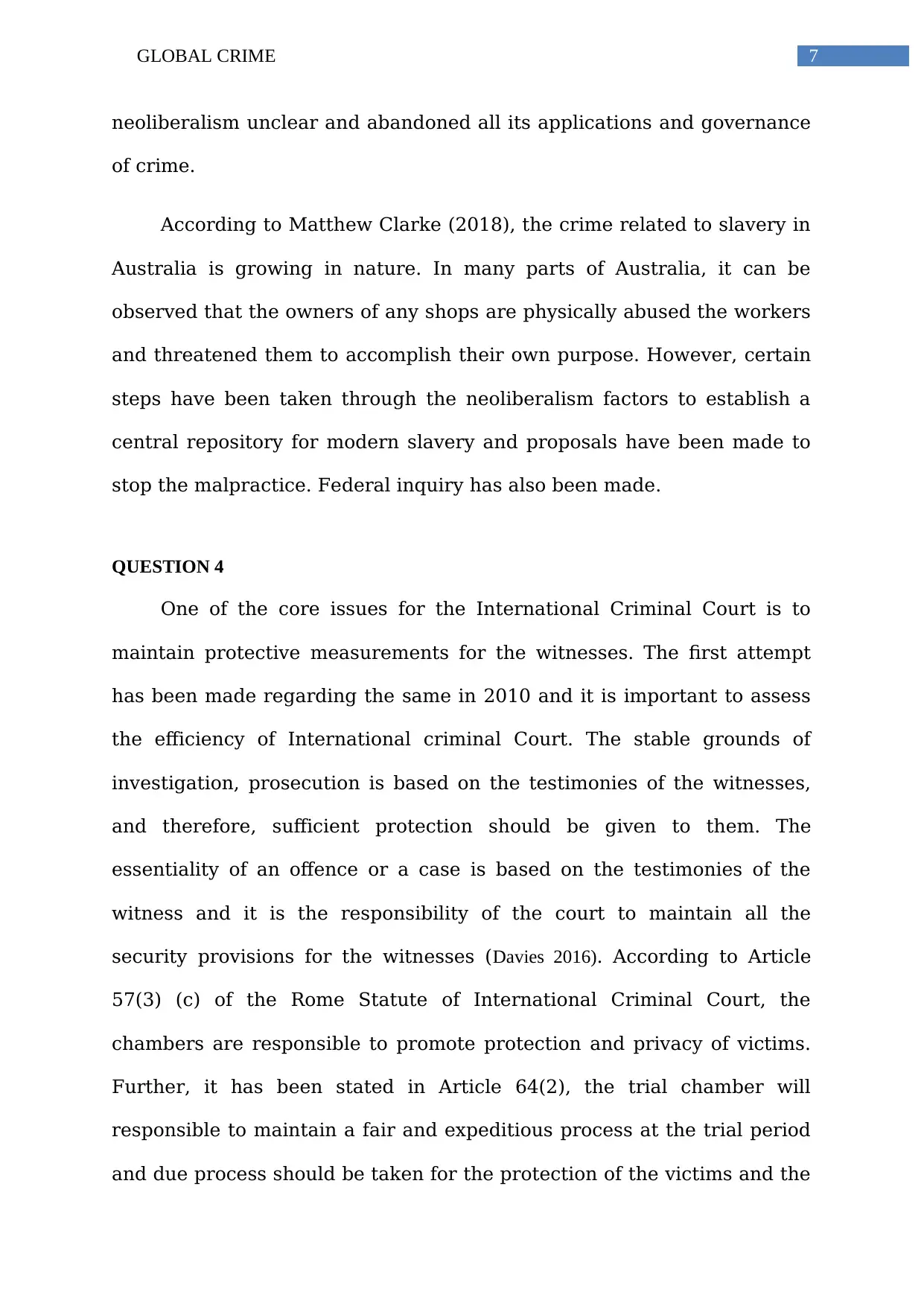
7GLOBAL CRIME
neoliberalism unclear and abandoned all its applications and governance
of crime.
According to Matthew Clarke (2018), the crime related to slavery in
Australia is growing in nature. In many parts of Australia, it can be
observed that the owners of any shops are physically abused the workers
and threatened them to accomplish their own purpose. However, certain
steps have been taken through the neoliberalism factors to establish a
central repository for modern slavery and proposals have been made to
stop the malpractice. Federal inquiry has also been made.
QUESTION 4
One of the core issues for the International Criminal Court is to
maintain protective measurements for the witnesses. The first attempt
has been made regarding the same in 2010 and it is important to assess
the efficiency of International criminal Court. The stable grounds of
investigation, prosecution is based on the testimonies of the witnesses,
and therefore, sufficient protection should be given to them. The
essentiality of an offence or a case is based on the testimonies of the
witness and it is the responsibility of the court to maintain all the
security provisions for the witnesses (Davies 2016). According to Article
57(3) (c) of the Rome Statute of International Criminal Court, the
chambers are responsible to promote protection and privacy of victims.
Further, it has been stated in Article 64(2), the trial chamber will
responsible to maintain a fair and expeditious process at the trial period
and due process should be taken for the protection of the victims and the
neoliberalism unclear and abandoned all its applications and governance
of crime.
According to Matthew Clarke (2018), the crime related to slavery in
Australia is growing in nature. In many parts of Australia, it can be
observed that the owners of any shops are physically abused the workers
and threatened them to accomplish their own purpose. However, certain
steps have been taken through the neoliberalism factors to establish a
central repository for modern slavery and proposals have been made to
stop the malpractice. Federal inquiry has also been made.
QUESTION 4
One of the core issues for the International Criminal Court is to
maintain protective measurements for the witnesses. The first attempt
has been made regarding the same in 2010 and it is important to assess
the efficiency of International criminal Court. The stable grounds of
investigation, prosecution is based on the testimonies of the witnesses,
and therefore, sufficient protection should be given to them. The
essentiality of an offence or a case is based on the testimonies of the
witness and it is the responsibility of the court to maintain all the
security provisions for the witnesses (Davies 2016). According to Article
57(3) (c) of the Rome Statute of International Criminal Court, the
chambers are responsible to promote protection and privacy of victims.
Further, it has been stated in Article 64(2), the trial chamber will
responsible to maintain a fair and expeditious process at the trial period
and due process should be taken for the protection of the victims and the
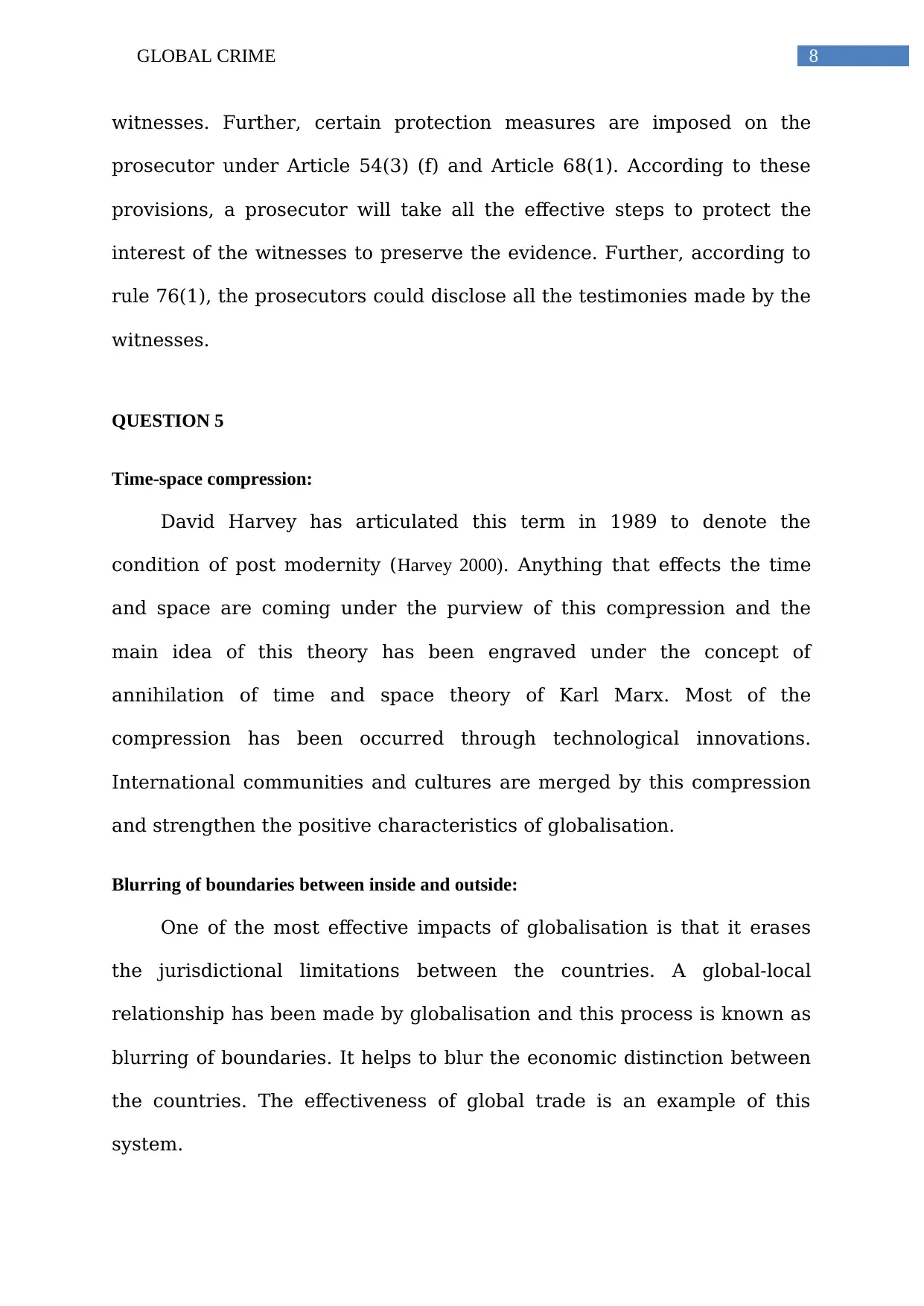
8GLOBAL CRIME
witnesses. Further, certain protection measures are imposed on the
prosecutor under Article 54(3) (f) and Article 68(1). According to these
provisions, a prosecutor will take all the effective steps to protect the
interest of the witnesses to preserve the evidence. Further, according to
rule 76(1), the prosecutors could disclose all the testimonies made by the
witnesses.
QUESTION 5
Time-space compression:
David Harvey has articulated this term in 1989 to denote the
condition of post modernity (Harvey 2000). Anything that effects the time
and space are coming under the purview of this compression and the
main idea of this theory has been engraved under the concept of
annihilation of time and space theory of Karl Marx. Most of the
compression has been occurred through technological innovations.
International communities and cultures are merged by this compression
and strengthen the positive characteristics of globalisation.
Blurring of boundaries between inside and outside:
One of the most effective impacts of globalisation is that it erases
the jurisdictional limitations between the countries. A global-local
relationship has been made by globalisation and this process is known as
blurring of boundaries. It helps to blur the economic distinction between
the countries. The effectiveness of global trade is an example of this
system.
witnesses. Further, certain protection measures are imposed on the
prosecutor under Article 54(3) (f) and Article 68(1). According to these
provisions, a prosecutor will take all the effective steps to protect the
interest of the witnesses to preserve the evidence. Further, according to
rule 76(1), the prosecutors could disclose all the testimonies made by the
witnesses.
QUESTION 5
Time-space compression:
David Harvey has articulated this term in 1989 to denote the
condition of post modernity (Harvey 2000). Anything that effects the time
and space are coming under the purview of this compression and the
main idea of this theory has been engraved under the concept of
annihilation of time and space theory of Karl Marx. Most of the
compression has been occurred through technological innovations.
International communities and cultures are merged by this compression
and strengthen the positive characteristics of globalisation.
Blurring of boundaries between inside and outside:
One of the most effective impacts of globalisation is that it erases
the jurisdictional limitations between the countries. A global-local
relationship has been made by globalisation and this process is known as
blurring of boundaries. It helps to blur the economic distinction between
the countries. The effectiveness of global trade is an example of this
system.
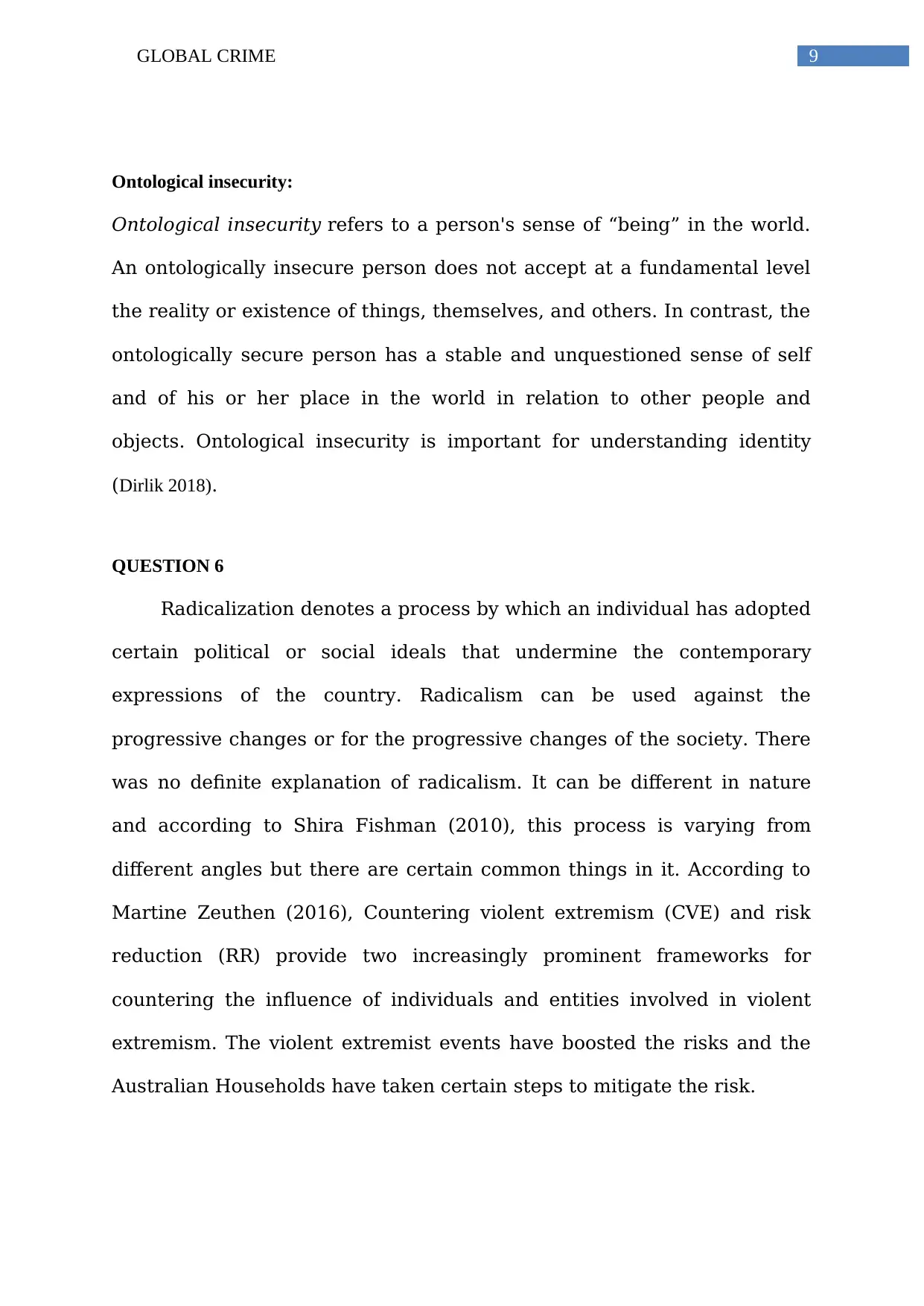
9GLOBAL CRIME
Ontological insecurity:
Ontological insecurity refers to a person's sense of “being” in the world.
An ontologically insecure person does not accept at a fundamental level
the reality or existence of things, themselves, and others. In contrast, the
ontologically secure person has a stable and unquestioned sense of self
and of his or her place in the world in relation to other people and
objects. Ontological insecurity is important for understanding identity
(Dirlik 2018).
QUESTION 6
Radicalization denotes a process by which an individual has adopted
certain political or social ideals that undermine the contemporary
expressions of the country. Radicalism can be used against the
progressive changes or for the progressive changes of the society. There
was no definite explanation of radicalism. It can be different in nature
and according to Shira Fishman (2010), this process is varying from
different angles but there are certain common things in it. According to
Martine Zeuthen (2016), Countering violent extremism (CVE) and risk
reduction (RR) provide two increasingly prominent frameworks for
countering the influence of individuals and entities involved in violent
extremism. The violent extremist events have boosted the risks and the
Australian Households have taken certain steps to mitigate the risk.
Ontological insecurity:
Ontological insecurity refers to a person's sense of “being” in the world.
An ontologically insecure person does not accept at a fundamental level
the reality or existence of things, themselves, and others. In contrast, the
ontologically secure person has a stable and unquestioned sense of self
and of his or her place in the world in relation to other people and
objects. Ontological insecurity is important for understanding identity
(Dirlik 2018).
QUESTION 6
Radicalization denotes a process by which an individual has adopted
certain political or social ideals that undermine the contemporary
expressions of the country. Radicalism can be used against the
progressive changes or for the progressive changes of the society. There
was no definite explanation of radicalism. It can be different in nature
and according to Shira Fishman (2010), this process is varying from
different angles but there are certain common things in it. According to
Martine Zeuthen (2016), Countering violent extremism (CVE) and risk
reduction (RR) provide two increasingly prominent frameworks for
countering the influence of individuals and entities involved in violent
extremism. The violent extremist events have boosted the risks and the
Australian Households have taken certain steps to mitigate the risk.
Secure Best Marks with AI Grader
Need help grading? Try our AI Grader for instant feedback on your assignments.
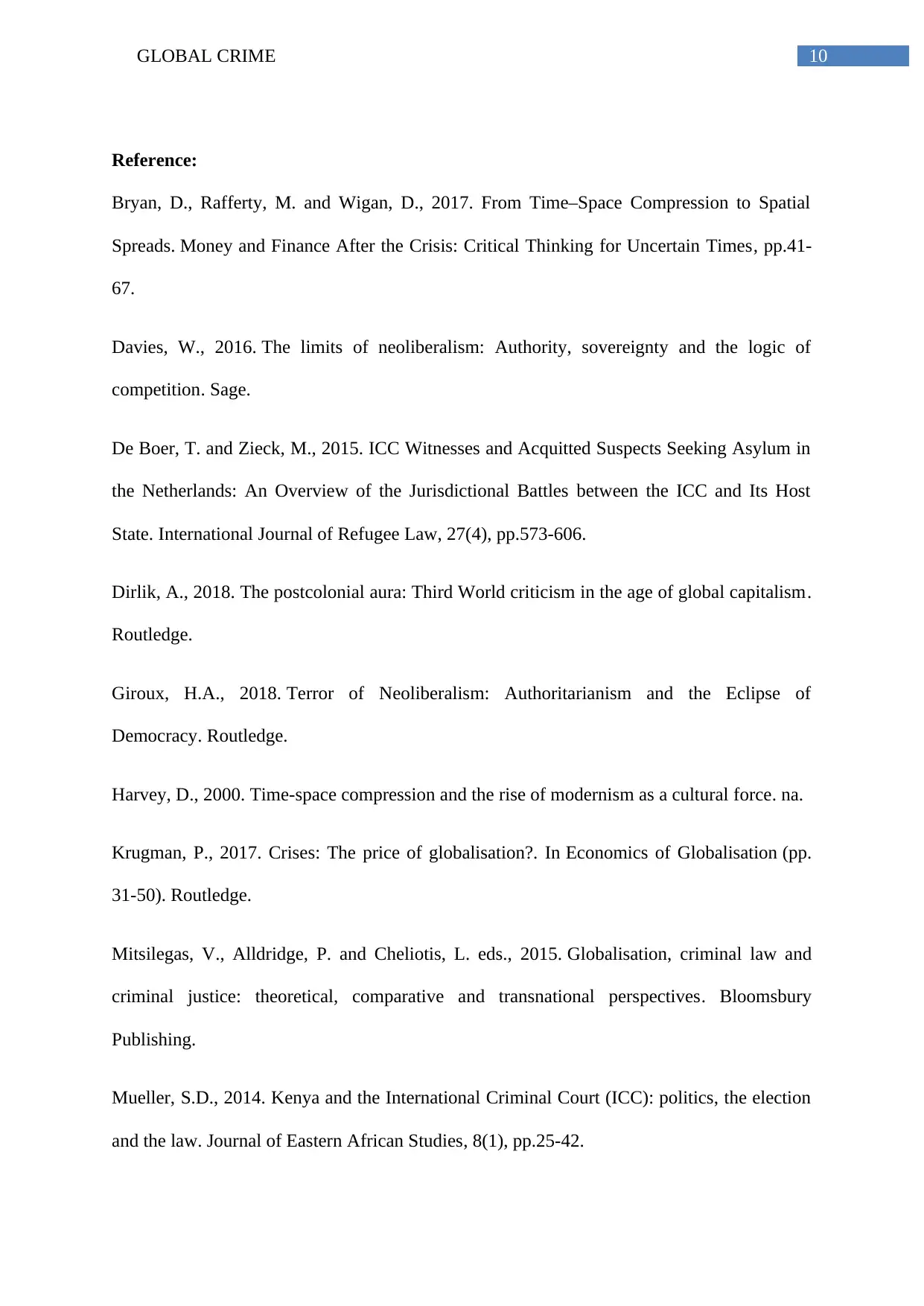
10GLOBAL CRIME
Reference:
Bryan, D., Rafferty, M. and Wigan, D., 2017. From Time–Space Compression to Spatial
Spreads. Money and Finance After the Crisis: Critical Thinking for Uncertain Times, pp.41-
67.
Davies, W., 2016. The limits of neoliberalism: Authority, sovereignty and the logic of
competition. Sage.
De Boer, T. and Zieck, M., 2015. ICC Witnesses and Acquitted Suspects Seeking Asylum in
the Netherlands: An Overview of the Jurisdictional Battles between the ICC and Its Host
State. International Journal of Refugee Law, 27(4), pp.573-606.
Dirlik, A., 2018. The postcolonial aura: Third World criticism in the age of global capitalism.
Routledge.
Giroux, H.A., 2018. Terror of Neoliberalism: Authoritarianism and the Eclipse of
Democracy. Routledge.
Harvey, D., 2000. Time-space compression and the rise of modernism as a cultural force. na.
Krugman, P., 2017. Crises: The price of globalisation?. In Economics of Globalisation (pp.
31-50). Routledge.
Mitsilegas, V., Alldridge, P. and Cheliotis, L. eds., 2015. Globalisation, criminal law and
criminal justice: theoretical, comparative and transnational perspectives. Bloomsbury
Publishing.
Mueller, S.D., 2014. Kenya and the International Criminal Court (ICC): politics, the election
and the law. Journal of Eastern African Studies, 8(1), pp.25-42.
Reference:
Bryan, D., Rafferty, M. and Wigan, D., 2017. From Time–Space Compression to Spatial
Spreads. Money and Finance After the Crisis: Critical Thinking for Uncertain Times, pp.41-
67.
Davies, W., 2016. The limits of neoliberalism: Authority, sovereignty and the logic of
competition. Sage.
De Boer, T. and Zieck, M., 2015. ICC Witnesses and Acquitted Suspects Seeking Asylum in
the Netherlands: An Overview of the Jurisdictional Battles between the ICC and Its Host
State. International Journal of Refugee Law, 27(4), pp.573-606.
Dirlik, A., 2018. The postcolonial aura: Third World criticism in the age of global capitalism.
Routledge.
Giroux, H.A., 2018. Terror of Neoliberalism: Authoritarianism and the Eclipse of
Democracy. Routledge.
Harvey, D., 2000. Time-space compression and the rise of modernism as a cultural force. na.
Krugman, P., 2017. Crises: The price of globalisation?. In Economics of Globalisation (pp.
31-50). Routledge.
Mitsilegas, V., Alldridge, P. and Cheliotis, L. eds., 2015. Globalisation, criminal law and
criminal justice: theoretical, comparative and transnational perspectives. Bloomsbury
Publishing.
Mueller, S.D., 2014. Kenya and the International Criminal Court (ICC): politics, the election
and the law. Journal of Eastern African Studies, 8(1), pp.25-42.
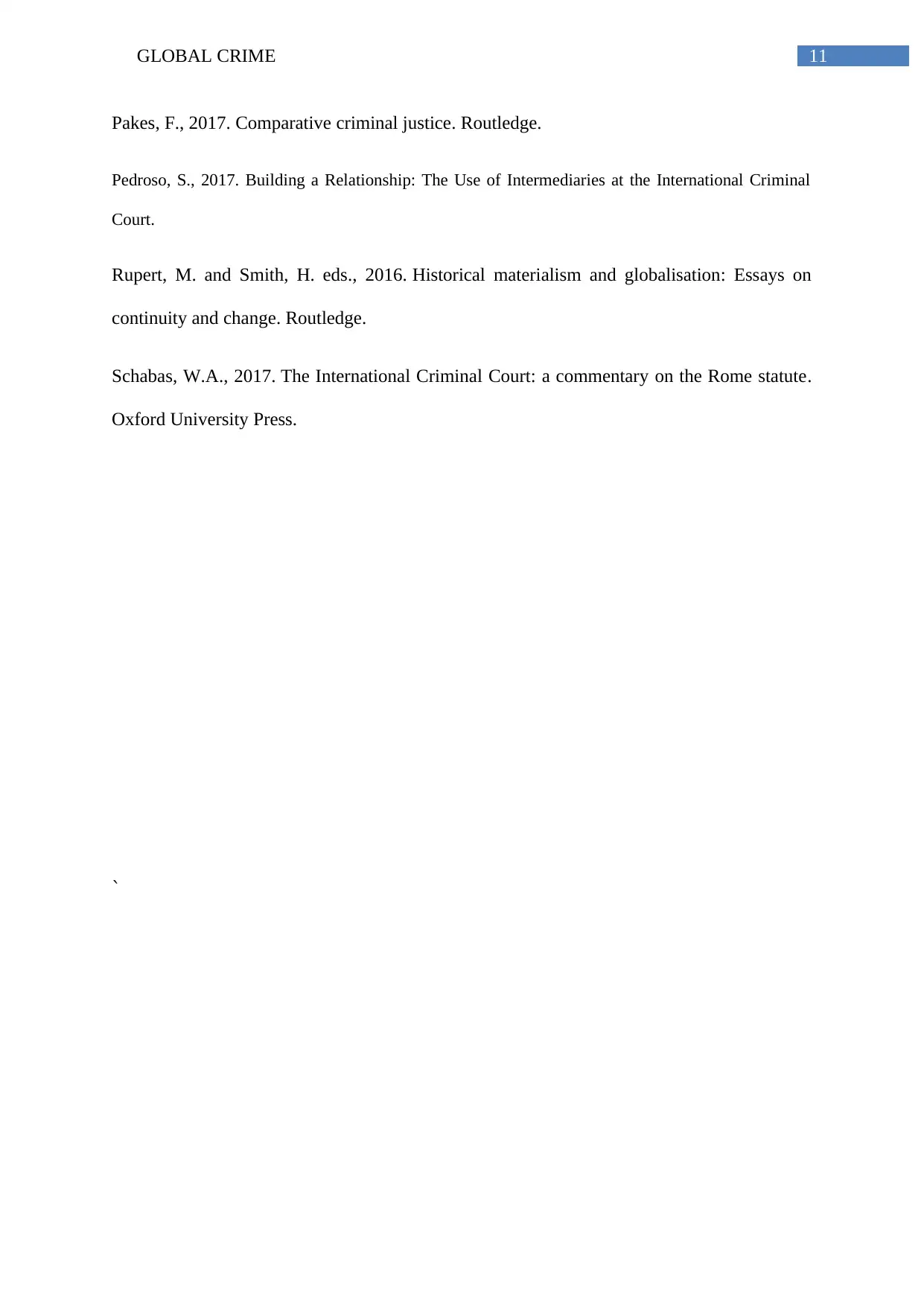
11GLOBAL CRIME
Pakes, F., 2017. Comparative criminal justice. Routledge.
Pedroso, S., 2017. Building a Relationship: The Use of Intermediaries at the International Criminal
Court.
Rupert, M. and Smith, H. eds., 2016. Historical materialism and globalisation: Essays on
continuity and change. Routledge.
Schabas, W.A., 2017. The International Criminal Court: a commentary on the Rome statute.
Oxford University Press.
`
Pakes, F., 2017. Comparative criminal justice. Routledge.
Pedroso, S., 2017. Building a Relationship: The Use of Intermediaries at the International Criminal
Court.
Rupert, M. and Smith, H. eds., 2016. Historical materialism and globalisation: Essays on
continuity and change. Routledge.
Schabas, W.A., 2017. The International Criminal Court: a commentary on the Rome statute.
Oxford University Press.
`
1 out of 12
Related Documents
Your All-in-One AI-Powered Toolkit for Academic Success.
+13062052269
info@desklib.com
Available 24*7 on WhatsApp / Email
![[object Object]](/_next/static/media/star-bottom.7253800d.svg)
Unlock your academic potential
© 2024 | Zucol Services PVT LTD | All rights reserved.





